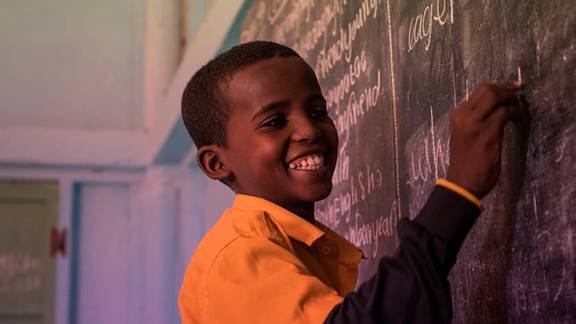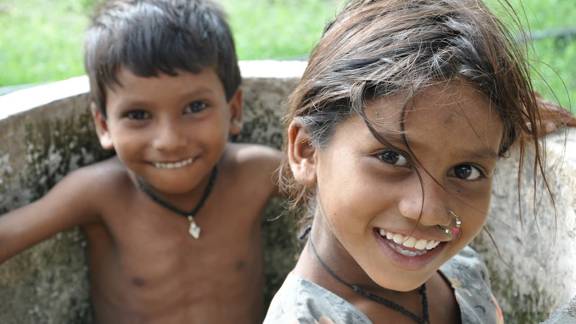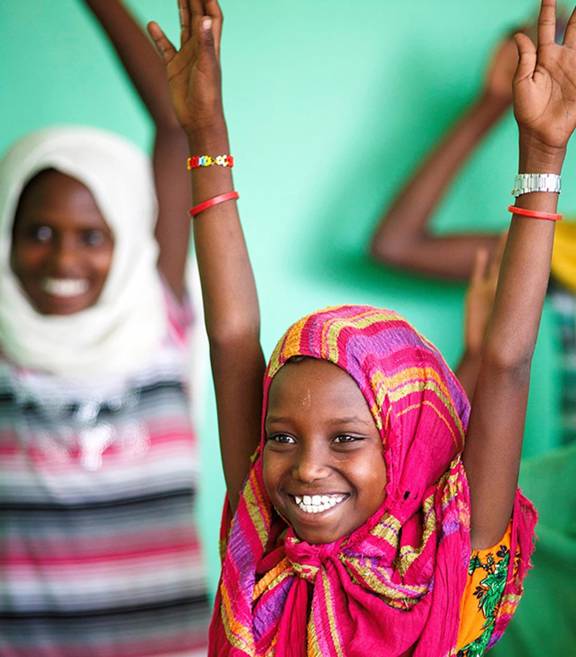Scotland and UNICEF Data For Children Collaborative
03 Mar 2021 • 5 minute read
Scotland has a unique collaboration with UNICEF to improve the mental health and wellbeing of children across the globe.

From tackling childhood obesity to providing access to health services, Scotland’s expertise in data science and the ethical use of data is making a difference. As Alex Hutchison, director of the Data for Children Collaborative, explains.
Scotland's cost-effective expertise
It was a meeting in New York with UNICEF, the United Nations programme dedicated to children’s welfare, that led to the creation of the Data for Children Collaborative.
The initiative harnesses Scotland’s data expertise to improve the lives of children around the world, and currently has projects in countries including Mozambique, Uganda, Jamaica and the Ivory Coast.
The Data Lab, Scotland's innovation centre for data and artificial intelligence is home to the collaborative partnership between UNICEF, the Scottish Government and the University of Edinburgh’s Data Driven Innovation Programme.
“The team at UNICEF said they were really keen to increase their work with data, but the costs of data scientists in New York are prohibitive,” explains Alex Hutchison, director of the Data for Children Collaborative.
“So, The Data Lab seized that opportunity and said: Scotland's got the talent to help. We've got a pipeline of people doing data science Masters and we've got the infrastructure.”
Ethical data you can trust
“Trust in how Scotland uses and respects data was key to the pitch that went to UNICEF,” Alex says.
The Collaborative uses a seven-step ‘responsible innovation’ framework to ensure its projects are designed and deployed safely and ethically, with children’s rights and interests in mind.
“It’s about having trust in the way that data or information is being told as a story,” Alex explains.
The Scottish Government’s backing and funding of the partnership is key to this approach.
“The Scottish Government is really keen that Scotland's talents and resources can have an impact elsewhere,” Alex says. “Scotland wants to play a part as a global citizen – and be able to help Mozambique with its vaccination programs or to help Cote d'Ivoire with its adolescents still having high percentages of HIV.”
Using data to improve nutrition
Scotland has a target to halve cases of childhood obesity by 2030, and better methods of regular monitoring and assessment will be vital in achieving this goal.
This Collaborative project is looking to better understand what children are eating and what influences these decisions. Scotland has an opportunity to support other countries in the global challenge to reduce obesity rates, by sharing the learning from evidence-based data analyses.

-
Tackling childhood poverty in Uganda
In Uganda, the Collaborative is looking at how child poverty affects a child’s physical access to services like health clinics and schools.
“We're looking at routes to health centres and schools, but using satellite imagery to understand how hard or easy it is to get across a marsh, along a tarmac road or across a river,” Alex explains.
Supporting vaccination programmes in Mozambique
In Mozambique, satellite data of buildings is also being used to help roll out vaccination programmes against Covid-19 and other diseases, by mapping how populations are dispersed.
“To do a vaccination program really well, you need to know where people are and how many people there are,” Alex says. “Census information and administrative data just doesn't give us that information on a granular level, particularly in rural and semi-urban areas of sub Saharan Africa.”
Improving adolescent mental health in Jamaica
In Jamaica, the Collaborative is running a mental health project using data science to understand how adolescent boys and girls are using different online platforms.
The aim is to then use these platforms to help funnel information and advice that promotes positive mental health.
Researching covid-19 impact on children
Projects in Scotland include creating a central catalogue of data on the socioeconomic impacts of Covid-19 on children in Scotland, to help other researchers with their work.
Another pandemic-related project involves using artificial intelligence to track and help debunk rumours and myths around Covid-19. This deploys chatbot technology using conversational artificial intelligence.
Scotland’s supportive data infrastructure
Scotland’s world-class data infrastructure includes the University of Edinburgh’s supercomputing centre – EPCC opens in a new window – formerly the Edinburgh Parallel Computing Centre. This is home to ARCHER2 opens in a new window , the UK's largest supercomputing facility and the UK's national supercomputing services.
"EPCC has some great examples of public sector data, particularly NHS data, and also compelling examples of how that data is governed and controlled," Alex says.
Sustainable public health outcomes
Nutrition, population, poverty, climate change and the other themes of the Data for Children Collaborative are linked back to the United Nations' Sustainable Development Goals opens in a new window .
These were adopted by the UN’s 193 member states in 2015 and include ending poverty, inequality, hunger and combatting climate change by 2030.
All the Data for Children Collaborative projects are run by a central team of four, including three team members at The Data Lab and a UNICEF project manager based in Bogota, Colombia.
“We have at least six key delivery people for each project, and then an infinite number of stakeholders we engage with,” Alex explains. “It's all about the adoption and sustainability of any outputs that we create, and also making sure we're not duplicating work that already exists."

You might also be interested in
-
Scotland is the place for data
Scotland is a growing and dynamic country with an exciting future at the heart of the data science revolution. It's the place to do great things with data.
-
Data and the farming revolution
SoilEssentials harnesses technology, data and intelligence to help reduce the use of pesticides, reduce CO2 emissions and improve efficiency and yields.
-
Space intelligence restoring peatland
An Edinburgh startup is helping to reverse the damage caused by humans to peatlands around the world which could reduce the rate of climate change.
Sign up to our newsletter
Get regular updates from us about the companies who choose to do business here.
Got a question?
Want to know more about Scotland's ethical data expertise and partnering opportunities for your business? We're here to help.
